Anoka-Ramsey Community
College
and Ever Cat Fuels,
LLC.,
both located in Minnesota, have
teamed up to encourage land
owners to plant Energy Crops-
The
SUSTAINABLE
way to produce Biodiesel.
Anoka-Ramsey Community
College's
Energy Crops and Beneficial
Insect study
Early May
2014, Anoka-Ramsey
Community College began their
study on energy crops and their
influence on beneficial
pollinating insects at the
demonstration site of
Anoka-Ramsey Community College's
Cambridge Campus.
Scroll
down page for dated project
information.
October 20-25, 2014:
-
The Genuity
Roundup Ready®
2 Yield
soybean, donated
by WinField, was
combined by Ben
and Gerald
Gelle, with a
13' flexible
head. The
soybean was
purchased by
Ecklund's Ag
Service of
Isanti, MN. The
soybean field
yielded 246
bushels. Waite-Altringer's
Online
Environmental
Science Lab
students
collected data
for soil
variances and
its effect upon
soybean growth.
The collected
data will be
posted shortly.
Click
HERE for
a YouTube
Video of the
soybean
being combined
and field prep
being completed
for next year's
research project. Click
on photos below
to enlarge.
|
|
.jpg)
|
|
10-22-14 A small portion of the demo plot being prepped for next year's research on soil conservation
|
|
.JPG)
|
|
10-22-14 Roundup Ready soybeans ready to be harvested
|
|
.JPG)
|
|
10-22-14 Harvesting the Roundup Ready soybeans
|
|
|
|
.JPG)
|
|
10-22-14 Roundup Ready soybean getting ready to be shipped for sale
|
|
.JPG)
|
|
10-22-14 Roundup Ready soybean getting ready to be shipped for sale
|
|
.jpg)
|
|
10-25-14 Waite-Altringer's Online Environmental Science lab class soil sampling at the ARCC demonstration site
|
|
|
|
.jpg)
|
|
10-25-14 Waite-Altringer's Online Environmental Science lab class soil sampling at the ARCC demonstration site
|
|
.jpg)
|
|
10-25-14 Waite-Altringer's Online Environmental Science lab class soil sampling at the ARCC demonstration site
|
|
.jpg)
|
|
10-25-14 Waite-Altringer's Online Environmental Science lab class soil sampling at the ARCC demonstration site
|
|
|
|
.jpg)
|
|
10-25-14 Waite-Altringer's Online Environmental Science lab class soil sampling at the ARCC demonstration site
|
|
.jpg)
|
|
10-25-14 Waite-Altringer's Online Environmental Science lab class soil sampling at the ARCC demonstration site
|
|
.jpg)
|
|
10-25-14 Waite-Altringer's Online Environmental Science lab class soil sampling at the ARCC demonstration site
|
|
|
|
.jpg)
|
|
10-25-14 Waite-Altringer's Online Environmental Science lab class soil sampling at the ARCC demonstration site
|
|
.jpg)
|
|
10-25-14 Waite-Altringer's Online Environmental Science lab class soil sampling at the ARCC demonstration site
|
|
.jpg)
|
|
10-25-14 Waite-Altringer's Online Environmental Science lab class soil sampling at the ARCC demonstration site
|
|
|
|
.jpg)
|
|
10-25-14 Waite-Altringer's Online Environmental Science lab class soil sampling at the ARCC demonstration site
|
|
.jpg)
|
|
10-25-14 Waite-Altringer's Online Environmental Science lab class soil sampling at the ARCC demonstration site
|
|
.jpg)
|
|
10-25-14 Waite-Altringer's Online Environmental Science lab class soil sampling at the ARCC demonstration site
|
|
|
September 12, 2014:
-
The Bayer CropScience
canola, InVigor
L130 & InVigor
L160S, was
combined by
Jeff DeYoung
using a John
Deere 9560,
with a 912 pick
up head. The
canola is being
purchased by
Northstar Agri
Industries and
was hauled away
by their "on
farm pick-up
service". The
canola field
yielded a clean
weight of
26,423lbs. The
Winfield
soybeans are
beginning to
yellow and lose
their leaves.
Frost was on the
fields the
morning of
September 13th.
Click
HERE for
a YouTube
Video of the canola
being combined. Click
on photos below
to enlarge.
|
|
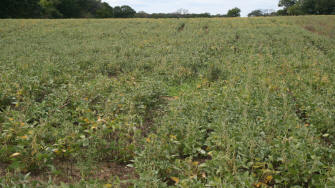
|
|
9-12-14 Winfield soybeans maturing on the demonstration plot of Anoka-Ramsey Community College's Cambridge campus.
|
|
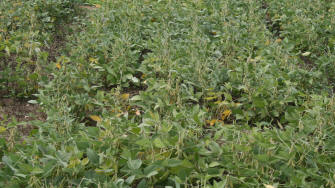
|
|
9-12-14 Winfield soybeans maturing on the demonstration plot of Anoka-Ramsey Community College's Cambridge campus.
|
|
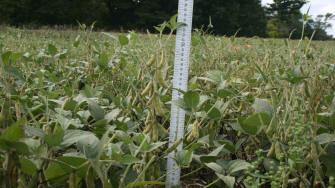
|
|
9-12-14 Winfield soybeans maturing on the demonstration plot of Anoka-Ramsey Community College's Cambridge campus.
|
|
|
|
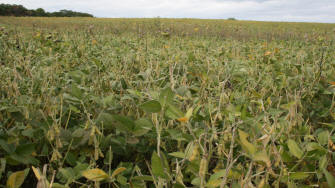
|
|
9-12-14 Winfield soybeans maturing on the demonstration plot of Anoka-Ramsey Community College's Cambridge campus. Most pods have three beans each.
|
|
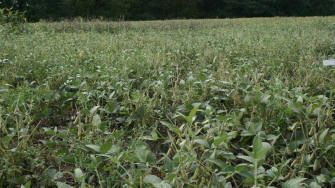
|
|
9-12-14 Winfield soybeans maturing on the demonstration plot of Anoka-Ramsey Community College's Cambridge campus.
|
|
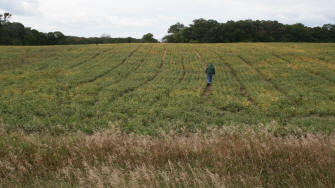
|
|
9-12-14 Winfield soybeans maturing on the demonstration plot of Anoka-Ramsey Community College's Cambridge campus.
|
|
|
|
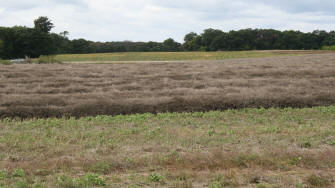
|
|
9-12-14 Dried Bayer CropScience canola in wind rows, ready to be combined. Windfiled Soybeans are maturing in field just beyond the canola fields.
|
|
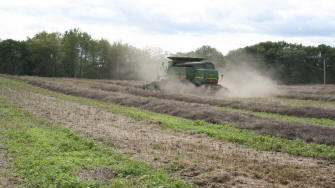
|
|
9-12-14 Wind rows of Bayer CropScience canola being combined.
|
|
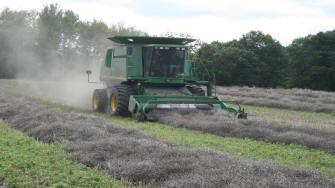
|
|
9-12-14 Wind rows of Bayer CropScience canola being combined.
|
|
|
|
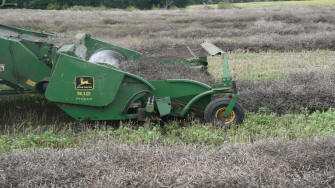
|
|
9-12-14 Wind rows of Bayer CropScience canola being combined.
|
|
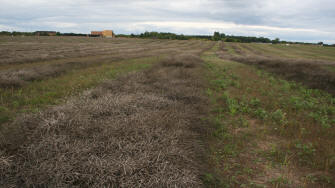
|
|
9-12-14 Bayer CropScience canola ready to be combined.
|
|
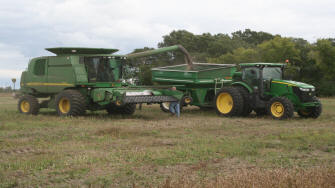
|
|
9-12-14 Bayer CropScience canola being placed in a grain bin, temporarily.
|
|
|
|
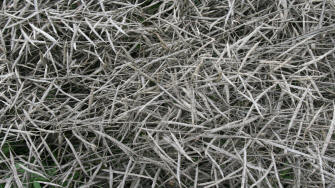
|
|
9-12-14 Dried Bayer CropScience canola on the Anoka-Ramsey Community College's Cambridge campus demonstration plot.
|
|
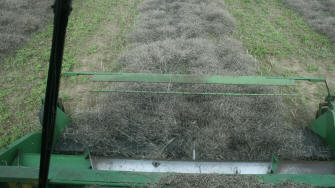
|
|
9-12-14 Cab view of the canola being combined.
|
|
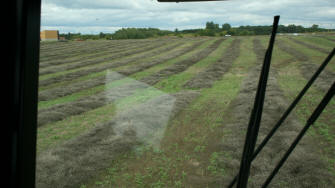
|
|
9-12-14 Cab View of the ARCC demonstration plot.
|
|
|
|
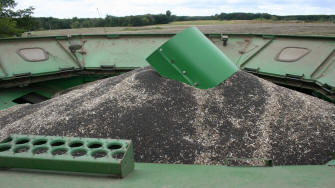
|
|
9-12-14 Bayer CropScience canola in the hopper of Jeff DeYoung's John Deere 9560.
|
|
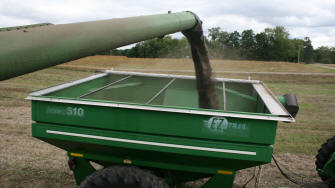
|
|
9-12-14 Bayer CropScience canola being placed in the grain bin, temporarily.
|
|
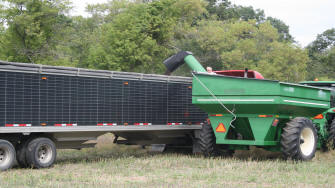
|
|
9-12-14 Bayer CropScience canola being placed in the Northstar Agri Industries' "on farm pick-up service" trailer.
|
|
|
|
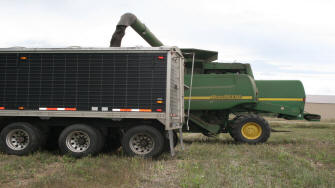
|
|
9-12-14 Bayer CropScience canola being placed in the Northstar Agri Industries' "on farm pick-up service" trailer.
|
|
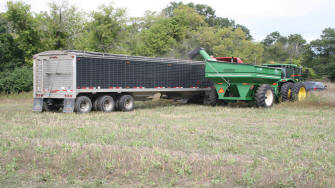
|
|
9-12-14 Bayer CropScience canola being placed in the Northstar Agri Industries' "on farm pick-up service" trailer.
|
|
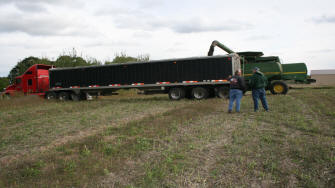
|
|
9-12-14 Bayer CropScience canola being placed in the Northstar Agri Industries' "on farm pick-up service" trailer.
|
|
|
August 16, 2014:
-
All of the Bayer
CropScience
canola, InVigor
L130 & InVigor
L160S, was
swathed and put
into windrows
for drying by
Jeff DeYoung
using a 2012
MacDon M155,
with a 20ft
draper head.
Click
HERE
for the data
from the
beneficial
insect study
within the
canola field.
The soybean is
growing well,
but is becoming
infested with
aphids.
Brigade will be
sprayed on the
soybean field
within the next
several days.
Click
HERE for YouTube
Video
of the canola
being swathed. Click
on photos below
to enlarge.
|
|
.JPG)
|
|
8-16-14 Swathing canola L130 & L160S using a 2012 MacDon with a 20ft draper head.
|
|
.JPG)
|
|
8-16-14 Canola swathed at ARCC demonstration site.
|
|
.JPG)
|
|
8-16-14 Swathing canola L130 & L160S using a 2012 MacDon with a 20ft draper head.
|
|
|
|
.JPG)
|
|
8-16-14 Very dry canola prior to being swathed
|
|
.JPG)
|
|
8-16-14 Cab view of canola being swathed
|
|
.JPG)
|
|
8-16-14 Cab view of canola being swathed
|
|
|
|
.JPG)
|
|
8-16-14 Swathing canola
|
|
.JPG)
|
|
8-16-14 Swathing canola
|
|
.JPG)
|
|
8-16-14 Swathing canola
|
|
|
|
.JPG)
|
|
8-16-14 Windrows of canola
|
|
.JPG)
|
|
8-16-14 Canola seeds
|
|
.JPG)
|
|
8-16-14 Swathed canola
|
|
|
|
.JPG)
|
|
8-16-14 Soybeans at the ARCC demonstration plot
|
|
.JPG)
|
|
8-16-14 Soybeans at the ARCC demonstration plot
|
|
.JPG)
|
|
8-16-14 Soybeans at the ARCC demonstration plot
|
|
|
|
.JPG)
|
|
8-16-14 Soybeans at the ARCC demonstration plot - ladybug feeding on aphids
|
|
.JPG)
|
|
8-16-14 Soybeans at the ARCC demonstration plot
|
|
.JPG)
|
|
8-16-14 Soybeans at the ARCC demonstration plot
|
|
|
August 12, 2014:
|
|
.jpg)
|
|
8-12-14 Canola at the ARCC demo plot
|
|
.jpg)
|
|
8-12-14 Canola at the ARCC demo plot
|
|
.jpg)
|
|
8-12-14 Canola at the ARCC demo plot
|
|
|
|
.jpg)
|
|
8-12-14 Canola at the ARCC demo plot
|
|
.jpg)
|
|
8-12-14 Canola at the ARCC demo plot
|
|
.jpg)
|
|
8-12-14 Canola pods opened
|
|
|
July 29, 2014:
|
|
.jpg)
|
|
7-29-14 Soybean field demonstration plot
|
|
.jpg)
|
|
7-29-14 Soybean field demonstration plot
|
|
.jpg)
|
|
7-29-14 Soybean field demonstration plot
|
|
|
July 12 -19, 2014:
-
At our site, the
canola flower
numbers are
reducing and the
pods are filling
out. The
soybeans are
growing well and
average around
13" in height.
Waite-Altringer's
online
environmental
science lab
students
conducted a soil
study within the
canola field.
The soil tests
included levels
of nitrogen,
phosphorus,
potassium, pH,
as well as
percolation
rates, canola
plant counts,
and topography.
Results will be
posted at a
later date. Click
on photos below
to enlarge.
|
|
.jpg)
|
|
7-12-14 Canola growing within the ARCC demonstration plot
|
|
.jpg)
|
|
7-12-14 Canola growing within the ARCC demonstration plot
|
|
.jpg)
|
|
7-16-14 Canola within the ARCC demonstration plot
|
|
|
|
.jpg)
|
|
7-16-14 Soybean field across from the canola field on the Cambridge campus
|
|
.jpg)
|
|
7-16-14 Soybean field across from the canola field on the Cambridge campus
|
|
.jpg)
|
|
7-19-14 Environmental science students soil testing within the canola field on the Cambridge campus
|
|
|
|
.jpg)
|
|
7-19-14 Environmental science students soil testing within the canola field on the Cambridge campus
|
|
.jpg)
|
|
7-19-14 Environmental science students soil testing within the canola field on the Cambridge campus
|
|
.jpg)
|
|
7-19-14 Environmental science students soil testing within the canola field on the Cambridge campus
|
|
|
|
.jpg)
|
|
7-19-14 Environmental science students soil testing within the canola field on the Cambridge campus
|
|
.jpg)
|
|
7-19-14 Environmental science students soil testing within the canola field on the Cambridge campus
|
|
.jpg)
|
|
7-19-14 Environmental science students soil testing within the canola field on the Cambridge campus
|
|
|
July 9, 2014:
|
|
.jpg)
|
|
6-30-14 Early emergent spring canola at ARCC demonstration plot
|
|
.jpg)
|
|
6-30-14 Pan trap set within ARCC spring canola field
|
|
.jpg)
|
|
7-9-14 Bee within spring canola field
|
|
|
|
.jpg)
|
|
7-9-14 Typical spring canola height within the ARCC demonstration plot
|
|
.jpg)
|
|
7-9-14 Soybean field a week after being sprayed with RoundUp
|
|
.jpg)
|
|
7-9-14 Soybean field one week after being sprayed to control weeds
|
|
|
June 23, 2014:
-
Spring Canola
Field is
beginning to
bloom.
Beneficial
insect study
begins at the
demonstration
plots early
maturity
canola field.
Study will
include a visual
inspection and
pan traps (3
colors: blue,
white & yellow).
The site had
been sprayed
with
Liberty on June
10th, 2014. Click
on photos below
to enlarge.
|
|
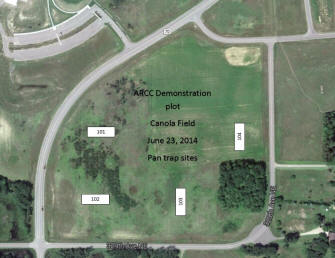
|
|
6-23-14 Pan trap locations within ARCC Canola field
|
|
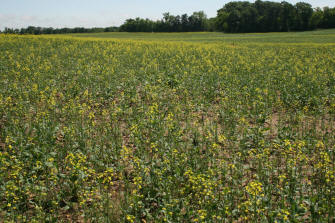
|
|
6-23-14 Canola blooming
|
|
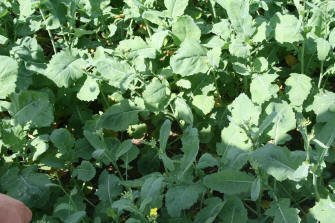
|
|
6-23-14 Canola at ARCC demonstration site
|
|
|
|
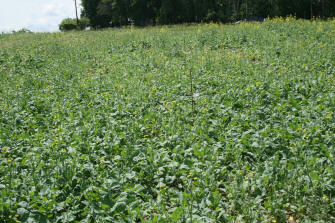
|
|
6-23-14 Pan traps set for beneficial insect study within canola field
|
|
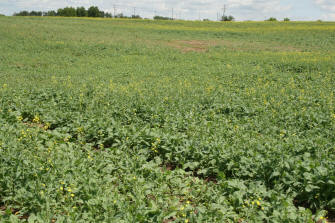
|
|
6-23-14 Canola field at ARCC demonstration plot
|
|
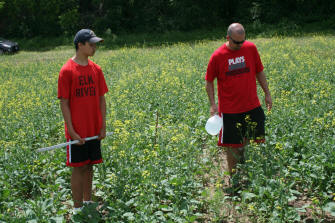
|
|
6-23-14 Setting pan traps for a beneficial insect study within canola field
|
|
|
June 9, 2014:
|
|
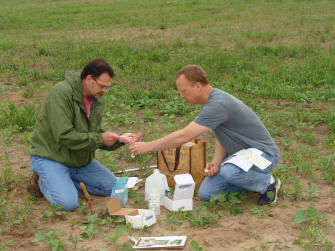
|
|
6-9-14 E3 conference work by High School teachers from around the state of MN- Soil testing
|
|
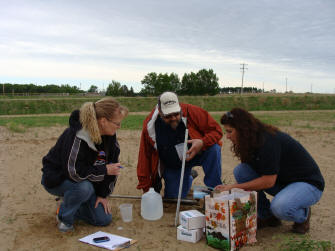
|
|
6-9-14 E3 conference work by High School teachers from around the state of MN- Soil testing
|
|
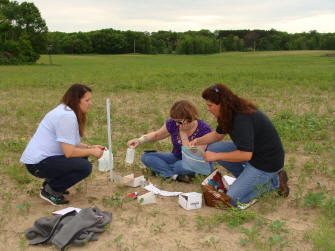
|
|
6-9-14 E3 conference work by High School teachers from around the state of MN- Soil testing
|
|
|
|
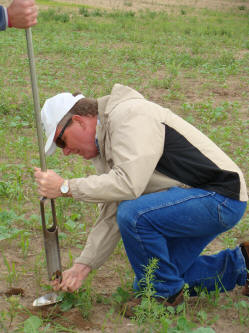
|
|
6-9-14 E3 conference work by High School teachers from around the state of MN- Soil testing
|
|
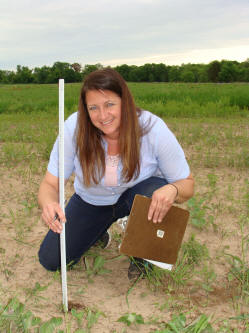
|
|
6-9-14 E3 conference work by High School teachers from around the state of MN- Soil testing
|
|
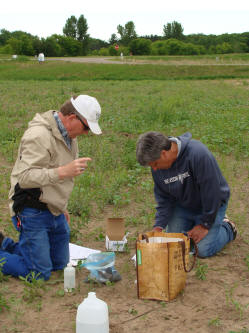
|
|
6-9-14 E3 conference work by High School teachers from around the state of MN- Soil testing
|
|
|
June 3 - June 4, 2014:
-
Soybeans &
Canola both
growing at the
demonstration
plots. No
herbicides have
been applied at
this point. The
large ruts seen
through the
canola fields
are due to
placing gopher
bait, in moist
soil, throughout
the plot. Click
on photos below
to enlarge.
|
|
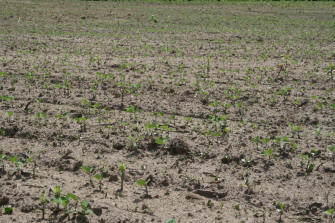
|
|
6-3-14 Soybean emerging
|
|
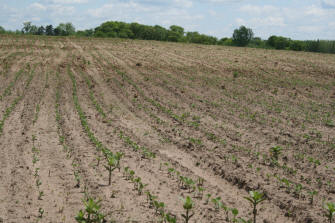
|
|
6-3-14 Soybean emerging at demonstration site
|
|
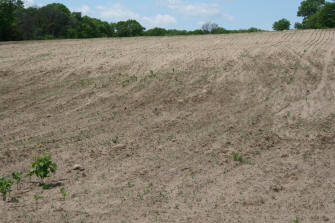
|
|
6-3-14 Soybean emerging at demonstration site
|
|
|
|
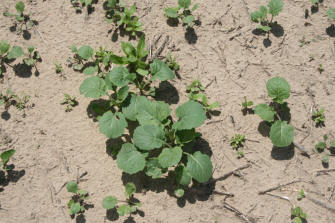
|
|
6-4-14 Canola growing at ARCC demonstration site
|
|
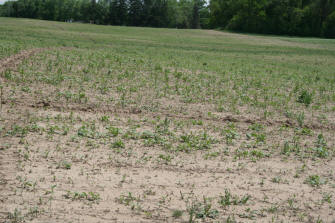
|
|
6-4-14 Canola growing at ARCC demonstration site -no herbicide applied
|
|
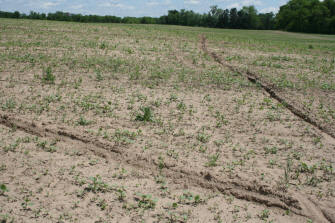
|
|
6-4-14 Canola growing at ARCC demonstration site -tracks at site are from placing gopher bait
|
|
|
May 21 - May 22, 2014:
-
The donated
Kelly land
across from the
College property
was disked,
harrowed, limed
(100lb/A) and
fertilized
(8-10-34-5 @
200lbs/A).
The field was
then planted
with Genuity
Roundup Ready®
2 Yield
soybean, donated
by WinField,
in 12" rows at
5 seeds per
linear foot. The
unfertilized
soil consisted
mainly of loamy
sand with a pH
of 5.7-6.8,
organic matter
at 0.6-1.1%,
phosphorus at
43-84ppm,
potassium at
45-194ppm, and
extremely low
nitrogen
levels.
This is the
first time in
MANY years that
the donated
fields have been
cultivated.
Canola seedlings
have started to
emerge on the
ARCC demo plot. Click
HERE for YouTube
Video of the soybean being
planted. Click
on photos below
to enlarge.
|
|
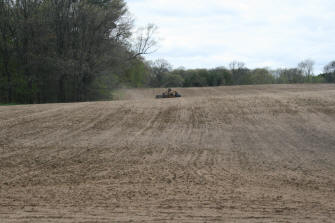
|
|
5-21-14 Genuity Roundup Ready 2 Yield soybean being planted
|
|
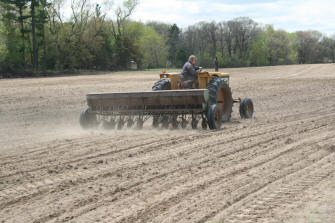
|
|
5-21-14 Genuity Roundup Ready 2 Yield soybean planted in 12" rows
|
|
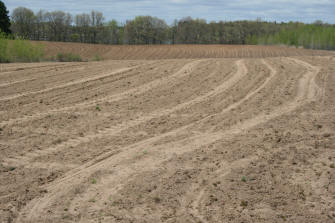
|
|
5-21-14 Genuity Roundup Ready 2 Yield soybean planted on donated Kelly land
|
|
|
|
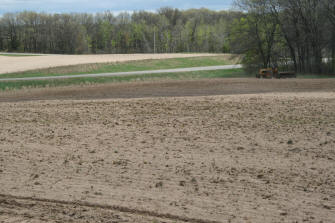
|
|
5-21-14 Soybean field (foreground) & Canola field (background) across Spirit River Drive
|
|

|
|
5-21-14 Invigor Canola seedlings
|
|
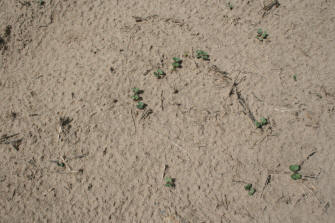
|
|
5-21-14 InVigor Canola seedlings
|
|
|
May 6 - May 7, 2014:
-
The College
owned 25 acre
demonstration
plot was disked,
harrowed, and fertilized
(33-8-0-8 @
300lbs/A). The
field was
planted with
Canola
InVigor hybrids
L130 & L160S,
donated by Bayer
CropScience,
using a Brillion
seeder at
~8lbs/acre. The
unfertilized
soil consisted
mainly of loamy
sand with a pH
of 5.7-6.8,
organic matter
at 0.6-1.1%,
phosphorus at
43-84ppm,
potassium at
45-194ppm, and
extremely low
nitrogen
levels. The
area had heavy
rain (2+") the
days just
following
planting. Click
HERE for YouTube
Video
of prep work &
canola being
planted. Click
on photos below
to enlarge.
|
|
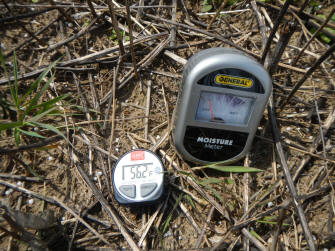
|
|
5-6-14 Soil temperature and moisture level
|
|
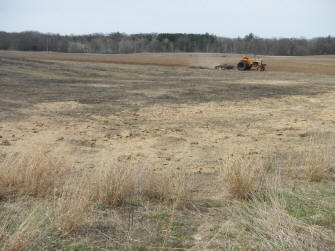
|
|
5-6-14 Field prep being completed using a plow and harrow
|
|
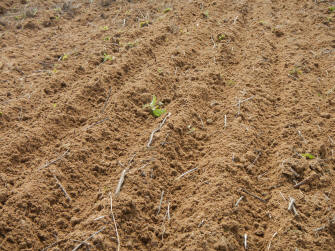
|
|
5-6-14 Field after plowed and harrowed
|
|
|
|
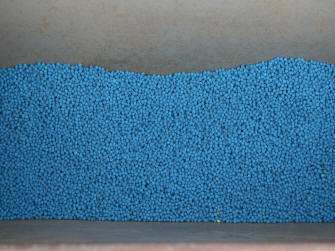
|
|
5-7-14 Canola hybrid InVigor L130 & L160S donated by Bayer CropScience
|
|
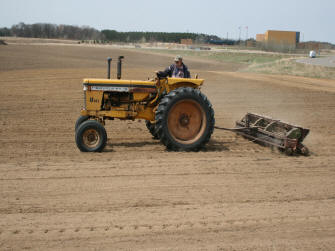
|
|
5-7-14 Canola L130 & L160S being planted using a Brillion seeder
|
|
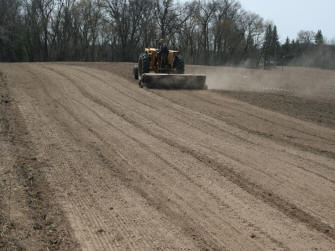
|
|
5-7-14 Canola L130 & L160S being planted using a Brillion seeder
|
|
|
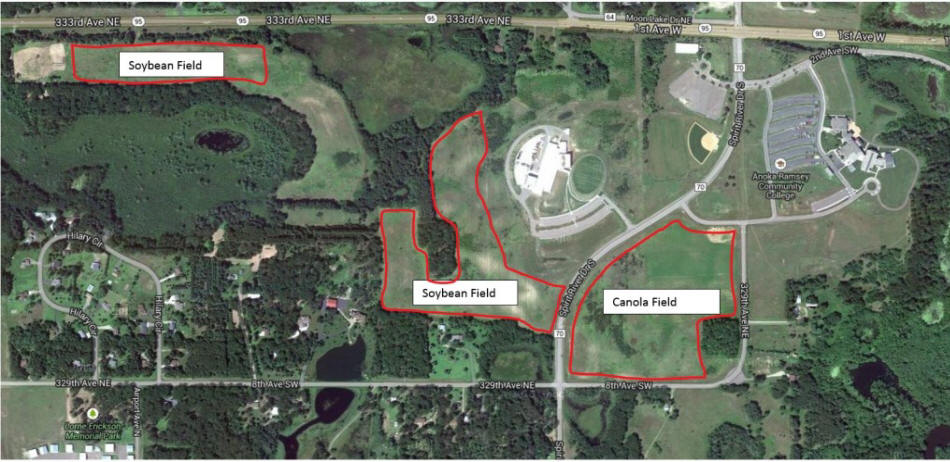
.jpg)
.jpg)
.jpg)
.jpg)
.jpg)
.jpg)
.jpg)
.jpg)
.jpg)
.jpg)
.jpg)
.jpg)
.jpg)
.jpg)
.jpg)
.jpg)
.jpg)
.jpg)
.jpg)
.jpg)
.jpg)
.jpg)
.jpg)
.jpg)
.jpg)
.jpg)
.jpg)
.jpg)
.jpg)
.jpg)
.jpg)
.jpg)
.jpg)
.jpg)
.jpg)
.jpg)
.jpg)
.jpg)
.jpg)
.jpg)
.jpg)
